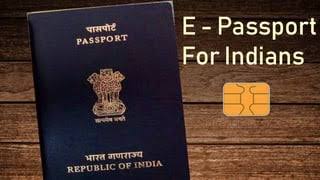India has formally started rolling out its next-generation chip-based biometric e-passports, ushering in a new era of international travel for Indians. The rollout, under Passport Seva Programme 2.0, launched in April 2024, is already operational in key cities and will roll out across the country by mid-2025.
What Makes E-Passports Different?
These e-passports have a Radio Frequency Identification (RFID) chip and antenna embedded in the cover, storing the owner's biometric and personal data such as fingerprints, facial images, name, date of birth, and passport number. This information is encrypted through advanced global security standards such as Basic Access Control (BAC), Passive Authentication (PA), and Extended Access Control (EAC), so forgery and duplication become near impossible.
A gold symbol under the front cover that is exclusive signifies the e-passport, placing India at the same level as over 120 countries-including the US, Canada, and Japan-already utilizing the technology.
Key Benefits for Travelers
Faster Immigration: Touchless, self-service e-gates in airports will slash waiting times and eliminate the requirement for labor-intensive manual checks.
Enhanced Security: The fingerprint verification and encrypted chip safeguard against passport forgery and identity theft.
Global Acceptance: Indian tourists will now find entry into the countries with e-gate and visa-on-arrival facilities smoother, adhering to international security requirements.
Where to Get an E-Passport?
E-passports are being launched at Regional Passport Offices in Nagpur, Bhubaneswar, Jammu, Goa, Shimla, Raipur, Amritsar, Jaipur, Chennai, Hyderabad, Surat, and Ranchi. Tamil Nadu started issuing e-passports from March 2025 and has already dispatched more than 20,700 in the state. The government plans to introduce more availability to all Passport Seva Kendras across the country in the next few months.
How to Apply
Citizens are able to submit applications online at the Passport Seva Portal, make an appointment at their Passport Seva Kendra or Post Office Passport Seva Kendra and give biometric data upon visiting. The e-passports are printed and embedded at India Security Press at Nashik and serve to assist the Make in India initiative.
Do You Need to Replace Your Existing Passport?
Existing passports are valid until they are due to expire. The transition to an e-passport is optional at this stage, with no urgent requirement for current passport owners.
Looking Ahead
India's move to biometric e-passports not only brings its passports into the modern age but puts its citizens at the forefront of secure, efficient global mobility. As the system expands, passengers can anticipate even greater convenience, security, and global acceptance in the years ahead.
Source: Financial Express
